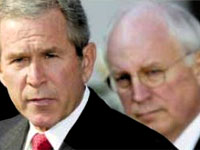
The Introduction to Paul Krugman's book, "The Great Unraveling" calls for a paradigm shift in how we look at today's World. That's because his reality has been shaken, and he shares his spine chilling revelation with us all.
Krugman, a Princeton economist, was offered a gig to write an opinion column in the New York Times. International financial crises were one of his specialties. When he took the Op-Ed job in 1999, he thought he would "write about the vagaries of the new economy, the impacts of globalization, and bad policies of other countries."
"But as events unfolded, politics inevitably intruded." Krugman eventually found himself "speaking very uncomfortable truth to power." "I began pointing out the outrageous dishonesty of the Bush administration." Krugman's book chronicles his commentaries on an unsettling pattern of abuse of power by the Bush administration.
As Krugman's book was about to go to press, someone brought Henry Kissinger's 1957 doctoral dissertation to his attention. Having the experience of critiquing the Bush administration in detail for several years, Krugman read a passage in Kissinger's dissertation "that sent chills down [his] spine, because they seemed all too relevant to current events." The passage describes how the general population responds to a "revolutionary power" that is taking over "a heretofore stable diplomatic system":
Kissinger wrote, "Lulled by a period of stability which had seemed permanent, they find it nearly impossible to take at face value the assertion of the revolutionary power that it means to smash the existing framework. The defenders of the status quo therefore tend to begin by treating the revolutionary power as if its protestations were merely tactical; as if it really accepted the existing legitimacy but overstated its case for bargaining purposes; as if it were motivated by specific grievances to be assuaged by limited concessions. Those who warn against the danger in time are considered alarmist; those who counsel adaptation to circumstances are considered balanced and sane.... But it is the essence of a revolutionary power that it possesses the courage of its convictions, that it is willing, indeed eager, to push its principles to their ultimate conclusion."
It's a case of "The Big Lie."
Krugman gives an example, of this "eager" "conviction," in a response that Supreme Court Justice Antonin Scalia gave to a "student who asked how he felt making the Supreme Court decision that threw the election to Bush. Was it agonizing? Did Scalia worry about the consequences? No: "It was a wonderful feeling," he declared."
Krugman used to be a fairly mainstream thinker until his epiphany that we are presently facing a revolutionary power that intends to undermine the principles and values of the United States. Krugman outlines his "rules for reporting" under these circumstances when the rulers are not playing by the rules:
1. Don't assume that policy proposals make sense in terms of their stated goals.
2. Do some homework to discover the real goals.
3. Don't assume that the usual rules of politics apply.
4. Expect a revolutionary power to respond to criticism by attacking.
5. Don't think that there's a limit to a revolutionary power's objectives (If they nominate a Supreme Court Justice who opposed Roe v Wade, they intend to overturn Roe v Wade).
With Bush in mind, a former director of the Brazilian mint once told me, "It's easier to prevent a dictatorship than it is to remove a dictatorship." He spoke from experience.



No comments:
Post a Comment